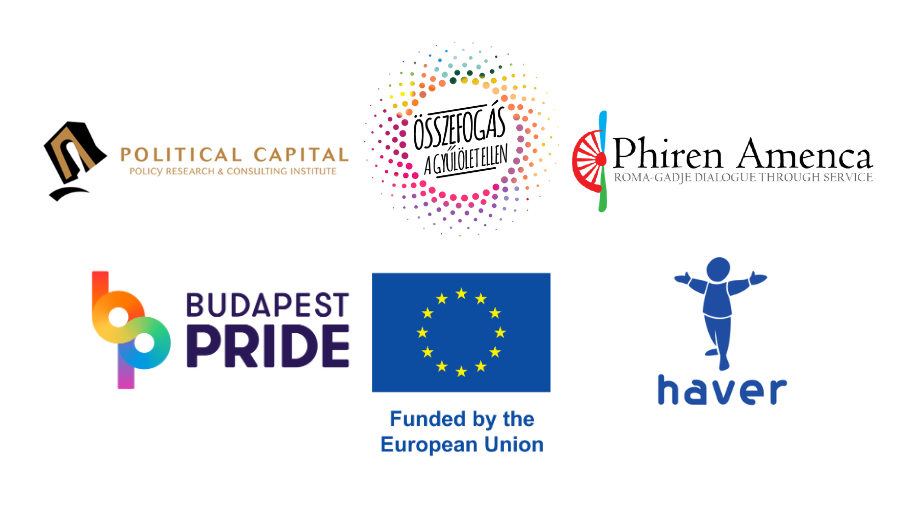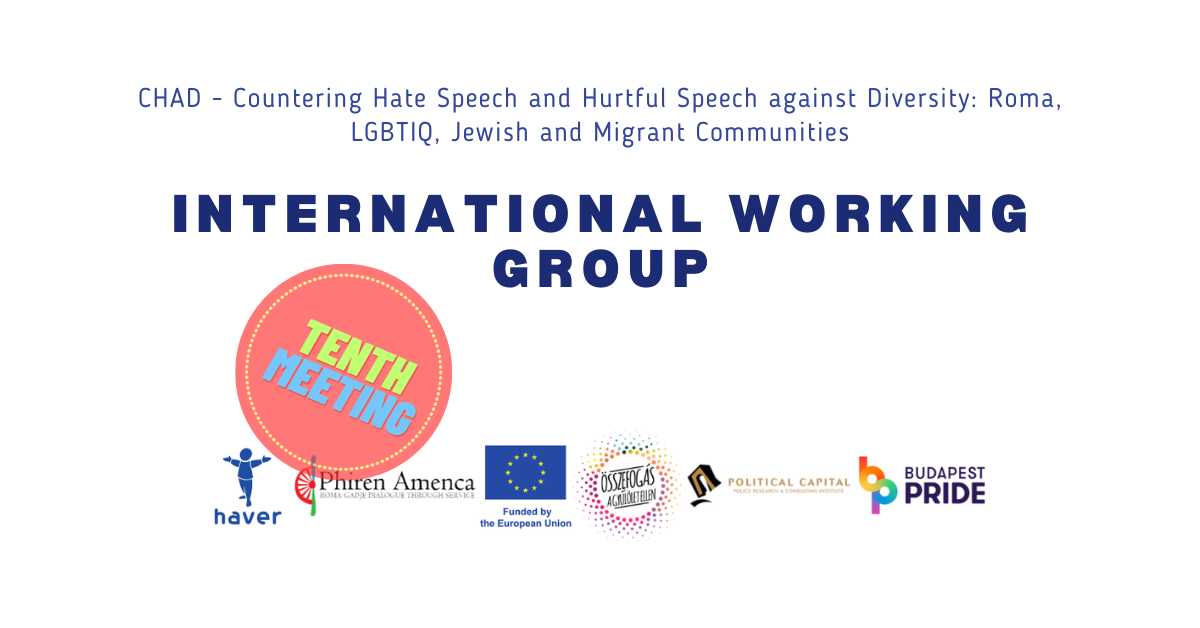March 12, 2024 – Online
The international working group, formed in the frame of the CHAD project, had its tenth meeting on 12 March 2024. The meeting aimed to discuss the international recommendations developed in the framework of the project, resulting from the working group process, the international Dimensions of Hate conference and a closed-door workshop organised by Political Capital.
At the meeting, Political Capital presented the process of preparing the recommendations, the recommendations themselves, and the dilemmas that arose while formulating them.
The process of creating the recommendations
The first step in creating the recommendations was identifying the issues connected to hate speech in different areas, such as legislation, law enforcement, the education system, the media, and civil society. The professional contribution of the conference and workshop participants and the working group members greatly helped the problem-mapping process. This way, the problems and areas of possible interventions resulted from the joint reflection of experts, representatives of interest groups, organisations representing minority groups, journalists and politicians who participated in the events.
Based on the problem mapping, recommendations were created in four broad areas: EU, Member States, media, and civil society. The difficulty in formulating the recommendations was that they had to reflect on the diversity of the EU countries’ societies and economies. Some recommendations are more aimed at Central and Eastern European countries, but as the international activities of the project mostly focused on this region, this was inevitable.
Recommendations for the EU
Formulating recommendations for the EU was challenging because there are existing efforts from the EU to counter hate speech. The most important recommendation in this area is that the European Council has to complete the ongoing process already started to extend the list of ‘EU crimes’ to include hate speech and hate crimes. Another key recommendation is related to the EU funding scheme. The EU support system is not sustainable; often, there is no possibility for long-term projects, and the provided support is not always targeted well. The EU has to address this issue.
Recommendations for the member states
The recommendations for the Member States were grouped into four categories: 1) general recommendations, recommendations for 2) the education system, 3) the justice system, and 4) the local governments. The main purpose of the general recommendations is to create a society free of prejudice, where minority groups are supported and included in the social discourse, and where members of society are aware of the challenges faced by minorities and vulnerable groups. These are preconditions for implementing action to counter hate speech. In the case of the justice system, it is crucial to investigate bias-motivated crimes properly and to have specially trained police officers and investigators to carry out this task. Proper investigations in this field could help the victims and reinforce their trust in receiving adequate justice. The effects of restorative justice and alternative sanctions must be assessed to see whether they are more likely to be beneficial or harmful for the victims and perpetrators. The education system’s role and importance in building tolerance and breaking down prejudices is proven, so the recommendations aim to extend and continue these efforts. The role of local governments is also doubtless; there are many great initiatives at the local level, but local authorities must be open to considering the opinions and needs of local minority groups.
Recommendations for the media
The main problems identified in this area are that the role of the media has changed: traditional media has lost its role as gatekeeper, and in some countries, state-coordinated media have become dominant, while independent and objective media have found it difficult to operate. Three of these recommendations are worth mentioning. The role of the media in spreading and combating offensive, prejudiced, and offensive language. It is recommended that media initiatives maintain connections with minority and vulnerable groups and minority media outlets, as their advice on the published content could ensure that these groups are represented fairly. Furthermore, the media should be able to promote intergroup dialogue and continue to publish articles of appropriate quality on minority issues, disinformation, and hate speech.
Recommendations for NGOs
The problems that civil organisations face include the need for more resources, social support, participation, and capacity. Experts agree that the popularity of volunteering is declining. Another key problem for civil society is the Government-Organized NGO phenomenon, i.e. the existence of organisations, in illiberal states in particular, that are funded by the government to advance its goals and convey its narrative. The recommendations for NGOs mainly encourage them to continue the awareness-raising or advocacy work they do even amid such difficulties.
Discussion
After the presentation of the recommendations, the working group members and the invited experts provided valuable and helpful feedback to make the recommendations more precise and targeted. A lively discussion took place on the presented points, and the experts agreed that these recommendations are very important and that their implementation could be greatly beneficial for reducing hate speech at the EU level. The experts also made suggestions on the dissemination by giving ideas for possible target organisations.

The „CHAD – Countering Hate Speech and Hurtful Speech against Diversity: Roma, LGBTIQ, Jewish and Migrant Communities” project (project nr. 101049309) is funded by the Citizens, Equality, Rights and Values Programme (CERV) of the DG Justice, European Commission and coordinated by RGDTS Nonprofit Llc. in partnership with Haver Informal Educational Foundation, Rainbow Mission Foundation and Political Capital. Views and opinions expressed are however those of the author(s) only and do not necessarily reflect those of the European Union or the European Commission. Neither the European Union nor the granting authority can be held responsible for them.


